A pity if scholars and researchers directly aim for a target while overlooking its neighborhood! If you want to enter a building, isn’t it best to become aware of what lies nearby and how they fit together? History’s like this and the crucial leads surface whenever the search goes astray. My recent biography of Ignaz Friedman
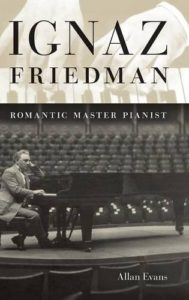
gathered significant leads on the most disparate paths. Anyone merely content with uncovering Ignaz Friedman’s Berlin Pariserstrasse address might have overlooked Max Beckmann (self portrait), an artist two years younger than Friedman, who lived down the block. As they probably breathed in the same night vapors I wondered if any interaction happened between Friedman, a late Romantic musician who dwelled in the golden decay of the 19th century, and forerunners such as the young Beckmann who were labelled as “expressionist.”
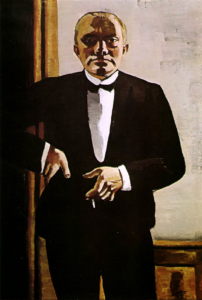
Alfred Döblin, another major writer in Berlin who echoes Beckmann’s aesthetic in prose kept a diary that offers his reaction to a Friedman piano recital, illustrating how the 20th century’s primary goal was to destroy the previous one’s aesthetics: their opposition helping me diagnose the motives behind later performers and critics who sought to suppress an earlier pianist by reviling a style had become alien to them and their supporters. Döblin writes:
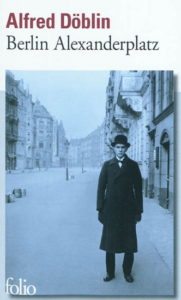
I began to listen to Chopin, or rather, to Herr Ignaz Friedman. In my Kalypso one can re-read in detail about the composer’s contribution to the carrying out of a work. The singer sings because she has a voice, not because she is Mozart. Mozart represents the primary source and Art consists of its dematerialization through a posterior spiritualism.
And so I continued listening to Chopin dancing on wobbly stilts, passing in front of me. Together with him, Friedman played with involvement and willingly: he projected quite well on the stage. Often he made spellbinding leaps in front of him, almost in a more refined way than Chopin, succeeding well in highlighting the delight, lightness, and superficiality, aware of the delicate. But when it comes to Chopin, Herr Friedman puffs himself up into an edema and his cheeks swell in ardor. After the effort, he was leaning back flirtatiously and smiled in affectation up to the point of being saccharine. Well, well, in this way I was able for a moment to take in a whiff of the “sweet” spirit of Chopin.
{Excerpt from Evans. Ignaz Friedman, Romantic Master Pianist.]
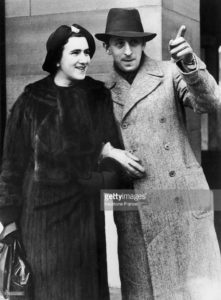
Just from having grown up in the Toscanini home, a central musical force in Milano, would have placed her recollections as uniquely invaluable social documents, but as Horowitz learned English, he grasped it as a business language and was surrounded by the perfunctory brown-nosing sycophants festering in “high-end” music’s commerce and acted the clown to keep them at a distance from his inner world. Posthumously uploaded videos show a couple of disparate souls who adored each other and how Wanda must have inherited a discerning ear from her father, the conductor Arturo Toscanini as her comments on what Horowitz should play reveals her role in as life as a safe harbor, one that grounds him from going astray. Imagine what she could have offered about the close people in their lives such as Rachmaninoff and Toscanini, the entire musical scene of half a century, all lost unless interviews or hypothetical diaries magically appear. Their experiences in Europe were entirely overlooked by monoglot authors who didn’t dare across over the Atlantic to chart foreign sources, such as Carlo Zecchi who knew the pre-war Horowitz and lived until 1984. Views of Horowitz’s art and life will remain incomplete until recollections of and by Wanda turn up. David Dubal told me that at Horowitz’s funeral, he asked Wanda why did Horowitz suffer so much anxiety and depression for most of his life: “Pogrom.”
Locating Friedman’s family made one curious about his wife Manya, a tall devout Russian-Orthodox noble who accepted a short atheist Jew in her life –Friedman. He would goad her on returning from church: “So, how was the turnout today?”

Manya passed way in 1969, some twenty-one years after Friedman. She too was hardly questioned about Friedman but luckily her family’s history involves contacts with the writers Lermontov and Tolstoy, the latter a relative by marriage. Manya’s mother Vera Schabelsky Schidlowsky

lived in Petersburg and spent time in southern Voronezh at the family’s Gobtarovka estate which she depicted in miniature paintings (circa 1880s, author’s collection):
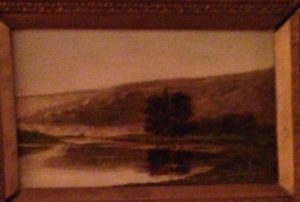
The family often spent time with the Tolstoys but made sure that impressionable young Manya would not overhear any of his heretical pronouncements. She came to know his daughters and was close to Tanya Albertini, a grand-daughter.

Tanya aided refugees in Italy during World War II. When I met her in 1983 she was all excited as her daughter had an upcoming wedding. “I married Albertini, an Italian, and now she is about to marry a man from Spain. Look how mixed we are and will become! This is the best way – when everyone mixes it becomes harder to hate!” She and a remote relative in Recanati, hometown of the poet-philosopher Giacomo Leopardi, offered other clues to their family, including some allusions to Friedman.
A remarkable event in Vera’s life came when her wishes to marry the Tsar’s brother were quashed by having a lower rank and she married his assistant “on the rebound” and had Manya with him (one assumes her husband was the father, although Manya’s face slightly resembles Vera’s beloved Grand Duke).

In the biography, several events lead us to a close-up of a character used by Dostoyevsky and a work of Tolstoy’s. From the Friedman biography we enter a remote corner in 19th century Russia that reaches further than one could anticipate, one in which the source of a Tolstoy novelette was exposed:
Again Vera’s marriage began to disintegrate. The couple embarked with two-year-old Manya on a journey to consult a living legend, a doctor of souls sought after by multitudes of pilgrims: farmers concerned about changing weather patterns and their crops, the sick and injured seeking cures or miracles, and those tormented by a crisis of faith. Some had made their journey barefoot, in the fervent hope that Father Ambrose would provide the answers to their woes. In the desert town of Optina- Pustyn, the family entered the grounds of the celebrated monastery where Father Ambrose had received Leo Tolstoy, before their meeting ended abruptly after a clash of views. Dostoyevsky also visited the monk’s cell, and left with a burning image of the believers’ ardor and the holy man’s perspicacity. He later shaped Ambrose into Father Zossima in The Brothers Karamazov:
It was said by many people about the elder Zossima that, by permitting everyone for so many years to come to bare their hearts and beg his advice and healing words, he had absorbed so many secrets, sorrows, and avowals into his soul that he could tell at the first glance from the face of a stranger what he came for, what he wanted, and what kind of torment racked his conscience. Indeed, he sometimes frightened his visitor by this knowledge of his secret before he had even time to utter a word.
When Vera and Boris Schidlowsky [Vera’s husband and Manya’s father] presented themselves, the holy man first blessed Maria, who presented him with a rabbit. Ambrose turned to the parents before they could utter a word, declaring, “You are not meant to be married. Part from one another and devote your lives to the church.” The family returned to Voronezh with Ambrose’s photo.
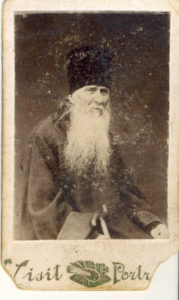
Boris entered a monastery, but after six months, Tsar Alexander III approved his petition to leave the church: “I’ve heard of officers wishing to become monks, but never a monk wanting to become a hussar.” Boris soon rejoined his old regiment.

(Vera became Abbess Valentina)
Russian society learned of the event, as did Vera’s second cousin Sophie Behrs, Tolstoy’s wife. Three years later, Tolstoy began crafting a short story, Father Sergius:

(Father Sergius: 1917 Russian silent film directed by Yakov Protazanov)
concerning an aide-de-camp to Tsar Nicholas who, a month before his marriage to a beautiful lady in waiting, suddenly cancels their wedding, disposes of his worldly possessions, and becomes a monk. “Prince Kasatsky” has finally realized that his fiancée is the tsar’s mistress, a fact known to everyone but him. He retires to a monastery as a disciple of its abbot, a pupil of Father Ambrose.
These many elements of inter-related cultures and ethnicities open a window onto the culture embodied in Ignaz Friedman’s playing. This Chopin recording
set me on a journey that grew from hearing the shellac aired in 1972 to a book that started in 1981, published in 2009, ending up with the author even more enamored with the playing of his pupil Ignace Tiegerman. I wish to express utmost gratitude to Henri Barda, a master musician based in Paris and musical heir to Friedman and Tiegerman by continuing their energy and way of channeling music, for his suggesting that Wanda Horowitz receive some much needed attention.
Friedman’s uncharted life was solved and some unreleased recordings by him and Tiegerman were restored with others for this edition:
:There is more to be found and the search will never cease.
Allan Evans ©2016

An important lesson for biographers: widen the search and learn from those who can say what the subject cannot!